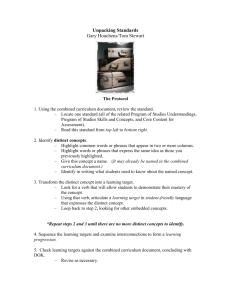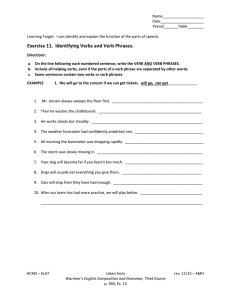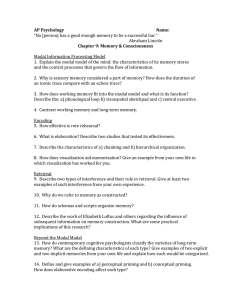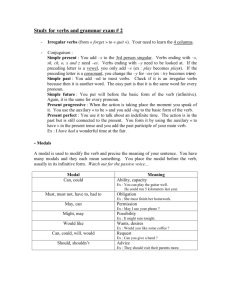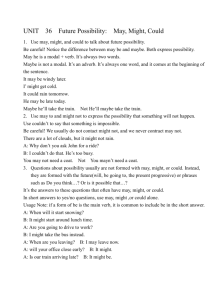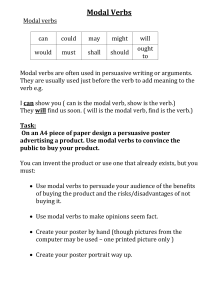Improving Written Communication: Modal Verb Phrase Problems English Beyond the Basics (2nd
advertisement
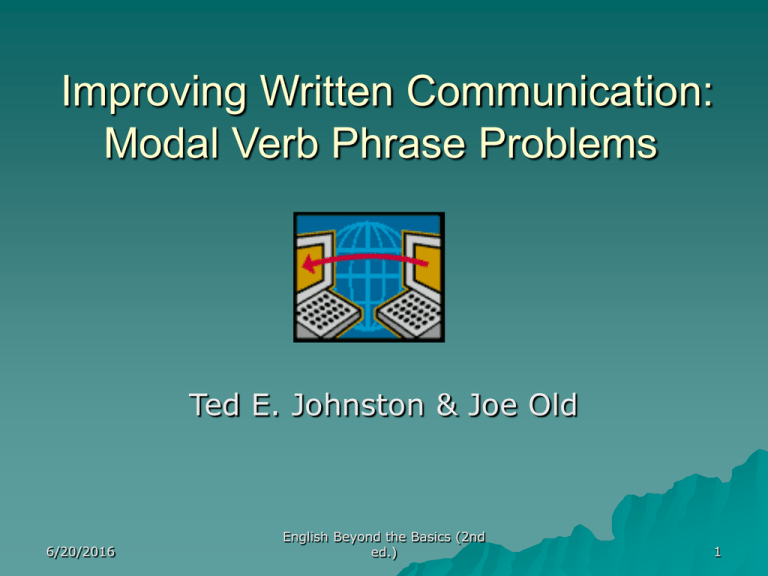
Improving Written Communication: Modal Verb Phrase Problems Ted E. Johnston & Joe Old 6/20/2016 English Beyond the Basics (2nd ed.) 1 Introduction Verb phrases are little engines that “run” a sentence. When assembling this engine, as with any engine, we need to be sure that we use only the right parts in the proper order so the engine will run smoothly without malfunction. The English verb system uses helping verbs more often than does the Spanish, partly because English has to achieve through modals what Spanish achieves through changes in verb endings: thus, English “she might have gone” in Spanish is “hubiera ido.” This presentation will discuss the answers to the following questions about verb phrases constructed with modals: 6/20/2016 English Beyond the Basics (2nd ed.) 2 Topics to be covered 1. How are modal verb phrases constructed? 2. What problems can occur with modal verb phrase construction? 6/20/2016 English Beyond the Basics (2nd ed.) 3 1. Constructing Modal Verb Phrases A. English uses ten modals that begin verb phrases consisting of two to four words, with the last word being the main verb. These are the ten modals used in two word phrases. Notice in the following discussions that a modal is followed by the base form of the verb: 6/20/2016 will go shall go can go may go would go should go could go might go must go ought to go English Beyond the Basics (2nd ed.) 4 1 continued. Constructing Modal Verb Phrases B. Two-word modal verb phrases, other than with “might” and the “-ould” modals, indicate either future or present time depending upon the context, and “may,” “might,” and the “-ould“ modals convey a conditional or speculative sense (as in something that is not definite) related to something that hasn’t occurred). Future/Present Uses I will read later. (leeré) We shall reach our goal. (lograremos) Children must obey their parents. (deben de obedecer) The boys can play soccer. (pueden jugar) The patient may leave now. (puede salirse) [Here “may” = permission] Conditional uses I would read later if I had a book. (leería) Our team should win next time. (debería ganar) We could go tomorrow, but right now we’re broke. (podríamos ir) Sam may [or might] visit me soon. (tal vez me visite) [Here “may” = possibility] 6/20/2016 English Beyond the Basics (2nd ed.) 5 1 continued. Constructing Modal Verb Phrases C. Two-word verb phrases with “could” can be used for the future (“I could go tomorrow if I wanted”) or for the past. Past uses of “could” refer to ability only and work like the Spanish imperfect (podía, etc.) rather than the preterite (pude, etc.). Thus, unlike Pude hacer el trabajo ayer, “I could do the job yesterday” does not necessarily mean that you actually did the job, only that you had the ability to do it. To show actual accomplishment, you would have to say something like “I managed to do the job yesterday.” I could run a three-minute mile a year ago. (podía correr, NOT pude correr) (I had the ability to run a three-minute mile. NOT: I actually managed to run a three minute mile.) In those days, we could sit and talk without interruption. (podíamos sentarnos y hablar NOT pudimos sentarnos y hablar) (We had the ability to sit and talk. NOT: We actually sat and talked.) 6/20/2016 English Beyond the Basics (2nd ed.) 6 1 continued. Constructing Modal Verb Phrases D. The modal “would” can also be used for the past or the future. The past use indicates something that occurred regularly in the past, not just something that occurred once or rarely. This use of “would” can be replaced with “used to” or the regular past tense. However, the future use of “would” is speculative only (as in “I would go tomorrow if I had a chance”). I would swim every afternoon from 2:00 to 3:00. (solía nadar—or—nadé) (I used to swim every afternoon—or—I swam every afternoon.) The children would play in the back yard every day for an hour. (solían jugar—or—jugaron) (The children used to play—or—The children played.) 6/20/2016 English Beyond the Basics (2nd ed.) 7 1 continued. Constructing Modal Verb Phrases E. “Would” and “could” and all the other modals (except “will” and “shall”) can also be used with the helper “have” to speculate about the past or to indicate unfulfilled obligation or expectation in the past. Here is the invariable pattern: MODAL + HAVE + Past Participle (Main Verb) Verb phrases with “will have” and “shall have” are future perfect uses. Martha might have left yesterday morning. (podría haber partido) My friend could have been confused about that matter. (podría haber estado confundido) The doctor should have done the surgery sooner. (debería haber hecho) She will have finished by next fall. (terminará antes que…) 6/20/2016 English Beyond the Basics (2nd ed.) 8 1 continued. Constructing Modal Verb Phrases F. All of the modals (except “can”) can also be used with the helper “be” for progressive purposes related to the present or future. Here is the invariable pattern: MODAL + BE + Present Participle (Main Verb) (Remember that English uses progressive verb phrases much more often than does Spanish to indicate action in the process of occurring at a particular moment.) Martha might be leaving as early as tomorrow morning at 7:00. (puede ser que se vaya) My friend could be writing the message right now. (estaría escribiendo) The doctor should be doing the surgery next week at this time. (literally debe estar haciendo) 6/20/2016 English Beyond the Basics (2nd ed.) 9 1 continued. Constructing Modal Verb Phrases G. All of the modals (except “can”) can be used with the helpers “have been” for past progressive constructions. Such four word verb phrases follow this pattern: MODAL + HAVE + BEEN + Present Participle (Main Verb) Again, the progressive indicates events actually in the process of occurring. Martha might have been leaving yesterday at this time. (tal vez estaba saliendo) My friend could have been writing the message then. (literally podría haber estado escribiendo) The doctor should have been doing the surgery at that time. (literally debería haber estado haciendo) 6/20/2016 English Beyond the Basics (2nd ed.) 10 1 continued. Constructing Modal Verb Phrases H. All of the modals (except “can”) can be used with the helpers “have been” for passive constructions related to the past. (Subjects of passive verbs receive action rather than perform it.) Such passive four word verb phrases follow this pattern: MODAL + HAVE + BEEN + Past Participle (Main Verb) The message could have been written yesterday. (literally podría haber sido escrito) The surgery should have been done long ago. (literally debería haber sido hecho) The task might have been completed previously. (literally hubiera sido cumplido) (You can also form the passive with MODAL + HAVE + BE + Past Participle (Main Verb): The message could also be written tomorrow.) 6/20/2016 English Beyond the Basics (2nd ed.) 11 1 continued. Constructing Modal Verb Phrases In summary, these are the basic formulas for constructing modal verb phrases (MV=Main Verb and P=Participle). Examples are given with a regular and an irregular verb. 1. 2 Words: Modal + MV Base Form I would receive the news. Tom would wear the shirt. 2. 3 Words: Modal + HAVE + MV Past P I would have received the news. Tom would have worn the shirt. 3. 3 Words (Progressive): Modal + BE + MV Present P I would be receiving the news. Tom would be wearing the shirt. 4. 4 Words (Progressive): Modal + HAVE + BEEN + MV PresentP I would have been receiving the news. Tom would have been wearing the shirt. 5. 4 Words (Passive): Modal + HAVE + BEEN + MV PastP The news would have been received by me. The shirt would have been worn by Tom. 6/20/2016 English Beyond the Basics (2nd ed.) 12 1 continued. Constructing Modal Verb Phrases At your desk write two examples of each formula with the regular verb “follow” and the irregular verb “hide.” Use the modal “could” in each of your sentences. Pick your own subjects and objects and repeat them (as demonstrated in the models). 1. (2 Words): Modal + MV Base Form (I would receive the news. Tom would wear the shirt.) 2. (3 Words): Modal + HAVE + MV Past P (I would have received the news. Tom would have worn the shirt.) 3. (3-Word Progressive): Modal + BE + MV Present P (I would be receiving the news. Tom would be wearing the shirt.) 4. (4-Word Progressive): Modal + HAVE + BEEN + MV PresentP (I would have been receiving the news. Tom would have been wearing the shirt.) 5. (4-Word Passive): Modal + HAVE + BEEN + MV PastP (The news would have been received by me. The shirt would have been worn by Tom.) 6/20/2016 English Beyond the Basics (2nd ed.) 13 1 continued. Constructing Modal Verb Phrases Here is one set of possibilities: 1. (2 Words): Modal + MV Base Form Joe could follow the car. They could hide the money. 2. (3 Words): Modal + HAVE + MV Past P Joe could have followed the car. They could have hidden the money. 3. (3 Word Progressive): Modal + BE + MV Present P Joe could be following the car. They could be hiding the money. 4. (4 Word Progressive): Modal + HAVE + BEEN + MV Present Joe could have been following the car. They could have been hiding the money. 5. (4 Word Passive): Modal + HAVE + BEEN + MV Past The car could have been followed by Joe. The money could have been hidden by them. 6/20/2016 English Beyond the Basics (2nd ed.) 14 1 continued. Constructing Modal Verb Phrases Even in verb phrases of three and four words, notice that we have seen that a modal is followed by the base form of any verb, including the helping verbs “be” and “have,” and regardless of the modal. should be writing could have written NOT: NOT: “should BEEN writing” “could HAD written” NOT: might have been writing “might HAD been writing” NOT: must have been written 6/20/2016 “must HAD been written” English Beyond the Basics (2nd ed.) 15 1 continued. Constructing Modal Verb Phrases Notice again that in modal verb phrases that “have” is followed by the past participle of any verb that follows it, including the helping verb “be,” regardless of the modal and the length of the verb phrase: could have sung NOT: should have been sung would have been singing 6/20/2016 could have SANG NOT: NOT: should have BEING sung would have BE singing English Beyond the Basics (2nd ed.) 16 2. Problems with Modal Verb Phrases Because of their complexity in form and meaning, a wide variety of problems can occur when constructing modal verb phrases. One problem is to follow one verb with the wrong form of the next verb in the phrase. REMEMBER: All modals are followed only by a base form verb, and the helper “have” can only be followed by a past participle. Explain what is wrong with each verb in red: 1. They could had helped us. 2. We should have went with them. 3. We should had went with them. 4. We would had received it sooner. 5. We would have receive it sooner. 6. We would had receive it sooner. 6/20/2016 English Beyond the Basics (2nd ed.) 17 2 continued. Problems with Modal Verb Phrases 1. Error: They could had helped us. (Modals can ONLY be followed by the base form.) Correct: They could have helped us. 2. Error: We should have went with them. (“Have” can ONLY be followed by the past participle.) Correct: We should have gone with them. 3. Error: We should had went with them. (Both rules from #1 and #2 have been broken!) Correct: We should have gone with them. 4. Error: We would had received it sooner. (See #1.) 5. Error: We would have receive it sooner. (See #2.) 6. Error: We would had receive it sooner. (See #3.) Correct: We would have received it sooner. 6/20/2016 English Beyond the Basics (2nd ed.) 18 2 continued. Problems with Modal Verb Phrases Which modal verb phrases are correct and which incorrect? 1. My aunt could had come sooner. 2. The engineers might have sent the plans yesterday. 3. My dad must have work later than usual. 4. You might had put the package in the closet. 5. We ought to have brought some wine or something. 6. They should had rang the bell first. 7. We will have being here for two hours already. 8. Couldn’t he have been punctual for a change? 6/20/2016 English Beyond the Basics (2nd ed.) 19 2 continued. Problems with Modal Verb Phrases 1. Error: My aunt could had come sooner. Correct: My aunt could have come sooner. 2. Correct: The engineers might have sent the plans yesterday. 3. Error: My dad must have work later than usual. Correct: My dad must have worked later than usual. 4. Error: You might had put the package in the closet. Correct: You might have put the package in the closet. 5. Correct: We ought to have brought some wine or something. 6. Error: They should had rang the bell first. Correct: They should had rung the bell first. 7. Error: We will have being here for two hours already. Correct: We will have been here for two hours already. 8. Correct: Couldn’t he have been punctual for a change? 6/20/2016 English Beyond the Basics (2nd ed.) 20 2 continued. Problems with Modal Verb Phrases The modal verb phrases in these sentences have less common but more serious errors related to both form and meaning. What is the problem in each sentence below, and how can it be corrected? 1. We might gone sooner. 2. For all we know, the manager might already called. 3. On the other hand, maybe they will finishing tomorrow. 4. The judge may gave them more time. 5. We will can do it tomorrow. 6. I don’t can understand her reasons. 7. Thankfully, the workers could complete the project yesterday. 8. Last night, I would watch old movies for several hours. 6/20/2016 English Beyond the Basics (2nd ed.) 21 2 continued. Problems with Modal Verb Phrases 1. Error: We might gone tomorrow. It isn’t clear which of the following the writer means. As you can see errors in modal verb phrases can be confusing as well as irritating: Correct: We might go sooner. (future) (If the meaning is for the future, future is expressed thus: Modal + MV base form.) Correct: We might have gone sooner. (If the meaning is for the past, the past is expressed thus: Modal + HAVE + MVPastP) 6/20/2016 English Beyond the Basics (2nd ed.) 22 2 continued. Problems with Modal Verb Phrases 2. Error: For all we know, the manager might already called. Again, the intended meaning isn’t clear: Correct: The manager might have already called. (If this is past speculation, then the pattern is: Modal + HAVE + MV PastP.) Correct: The manager might already be called. (If this is the passive voice, and someone else called the manager, then the pattern is: Modal + HAVE + BE + MV PastP.) 6/20/2016 English Beyond the Basics (2nd ed.) 23 2 continued. Problems with Modal Verb Phrases 3. Error: On the other hand, maybe they will finishing tomorrow. Again, what is the intended meaning? Correct: On the other hand, maybe they will be finishing tomorrow. (The future progressive, which is slightly different from the simple future in that it doesn’t necessarily mean that they will actually finish, is expressed thus: Modal + BE + MV PresentP.) Correct: On the other hand, maybe they will finish tomorrow. (The simple future is expressed thus: Modal + MVBase Form.) 6/20/2016 English Beyond the Basics (2nd ed.) 24 2 continued. Problems with Modal Verb Phrases 4. Error: The judge may gave them more time. What is the intended meaning? Correct: The judge may give them more time. Correct: The judge may have given them more time. 5. Error: We will can do it tomorrow. (Modals can never be combined with other modals.) Correct: We can do it tomorrow. Correct: We will do it tomorrow. 6. Error: I don’t can understand her reasons. (The “to do” helper is never used in conjunction with any modal.) Correct: I don’t understand her reasons. Correct: I can’t understand her reasons. 6/20/2016 English Beyond the Basics (2nd ed.) 25 2 continued. Problems with Modal Verb Phrases 7. Error: Thankfully, the workers could complete the project yesterday. (“Could” used for the past refers to a past ability to do something, but it does not always imply an actual accomplishment. This use of “could” is not mean the same thing as “pudieron cumplir.”) Correct: Thankfully, the workers completed the project yesterday. Correct: Thankfully, the workers were able to complete the project yesterday. (Strangely enough, “was/were able” to do something implies both ability and accomplishment.) 8. Error: Last night, I would watch old movies for several hours. (“Would” used for the past can only refer to a recurring situation not just to something that happened on one occasion.) Correct: Last night, I watched old movies for several hours. 6/20/2016 English Beyond the Basics (2nd ed.) 26 For further study 1. For more information on modal helpers, in the handbook, study Vh-2, especially focusing on Vh-2a. 2. For more information on mistranslating “could,” see Vt-2e in the handbook. 3. In the workbook, do exercises 2.2, 2.3, 2-Edit 1, and 16.6. The last three exercises mix various types of verb phrase problems and do not focus exclusively on modals. 6/20/2016 English Beyond the Basics (2nd ed.) 27
